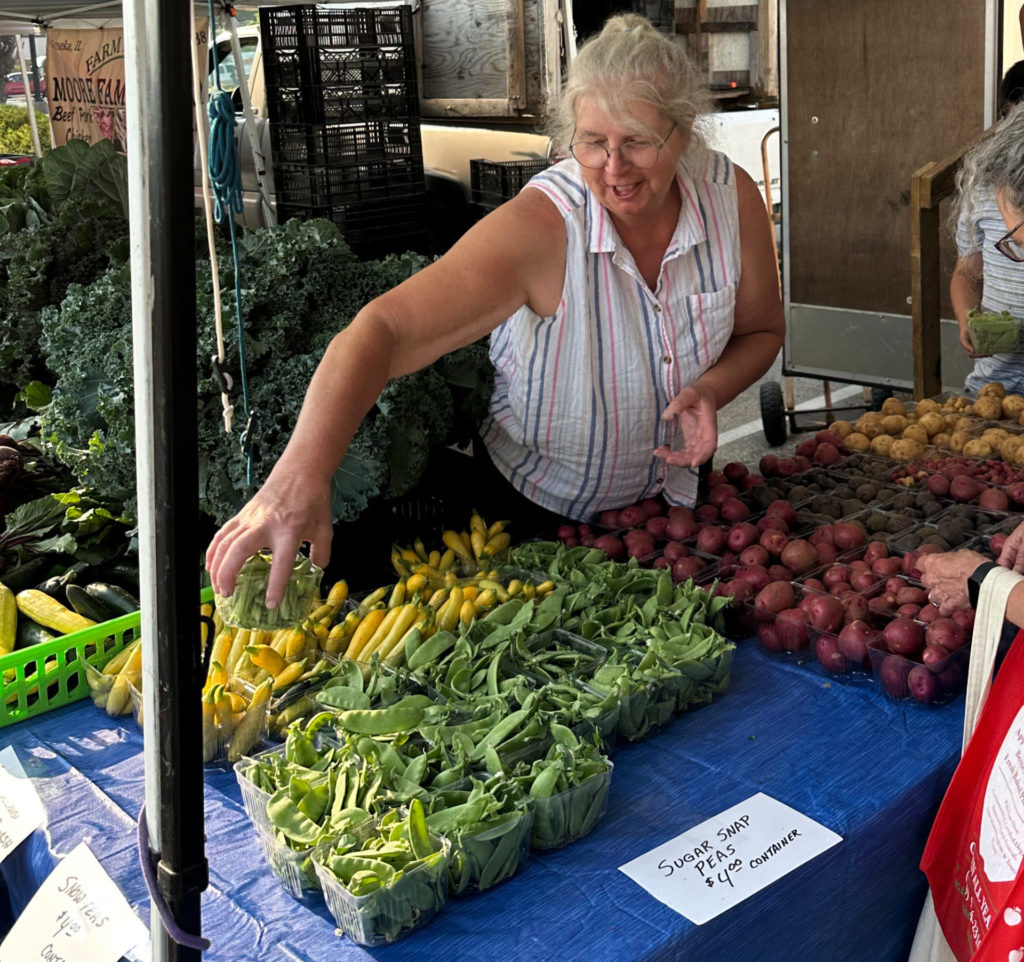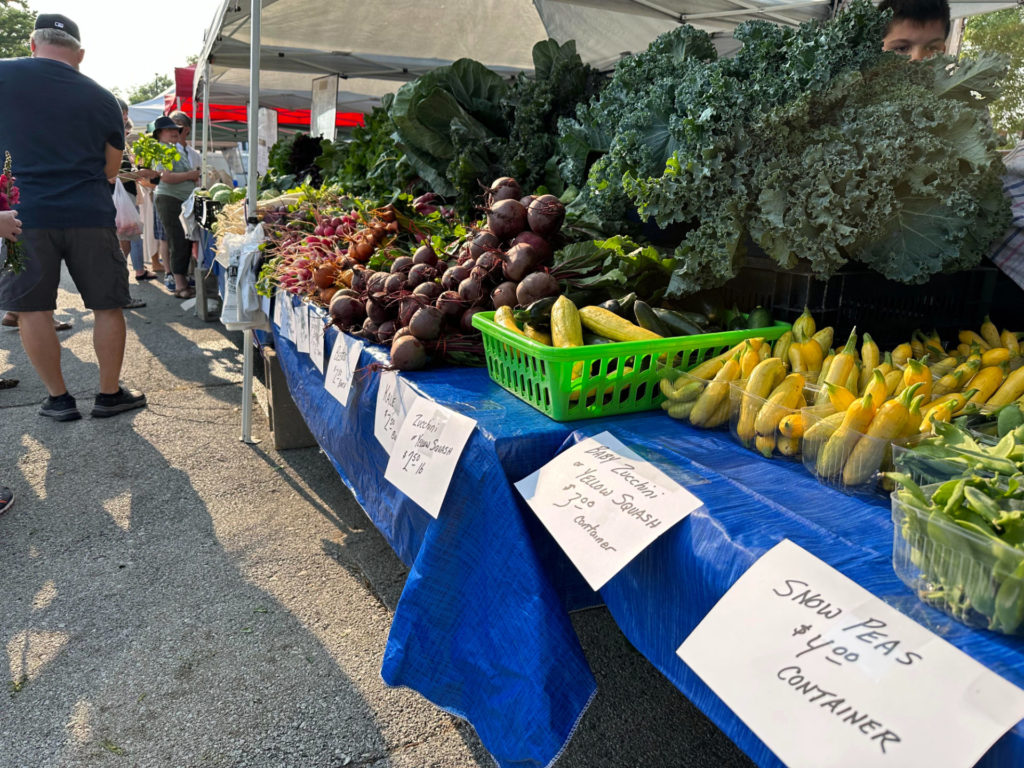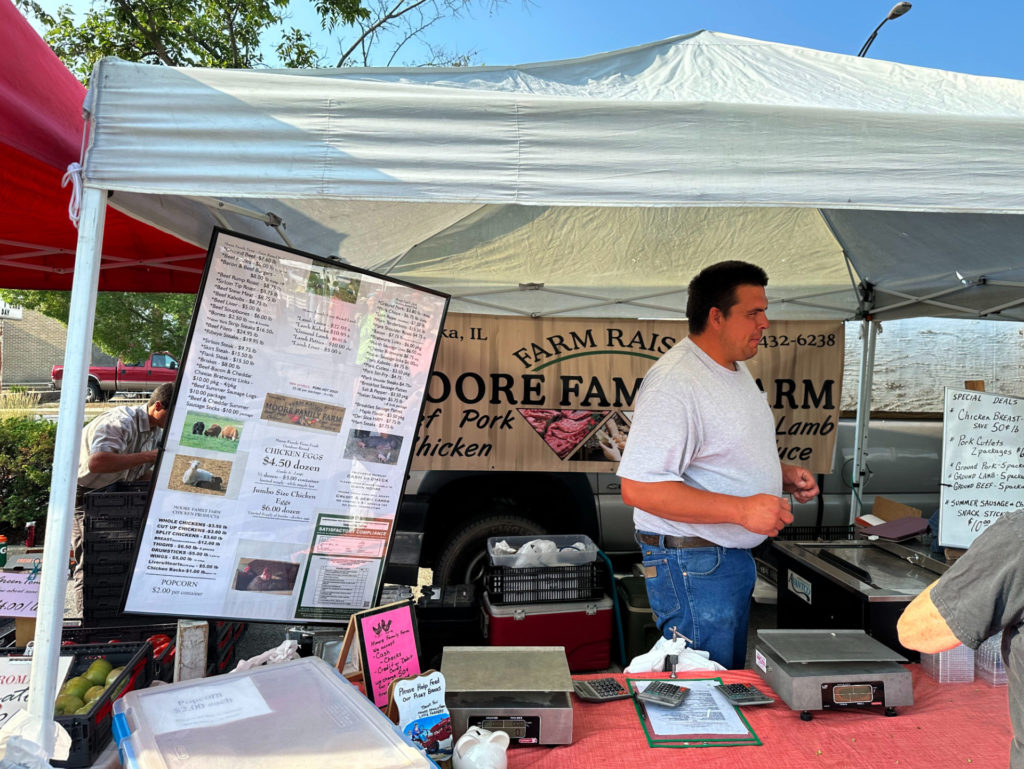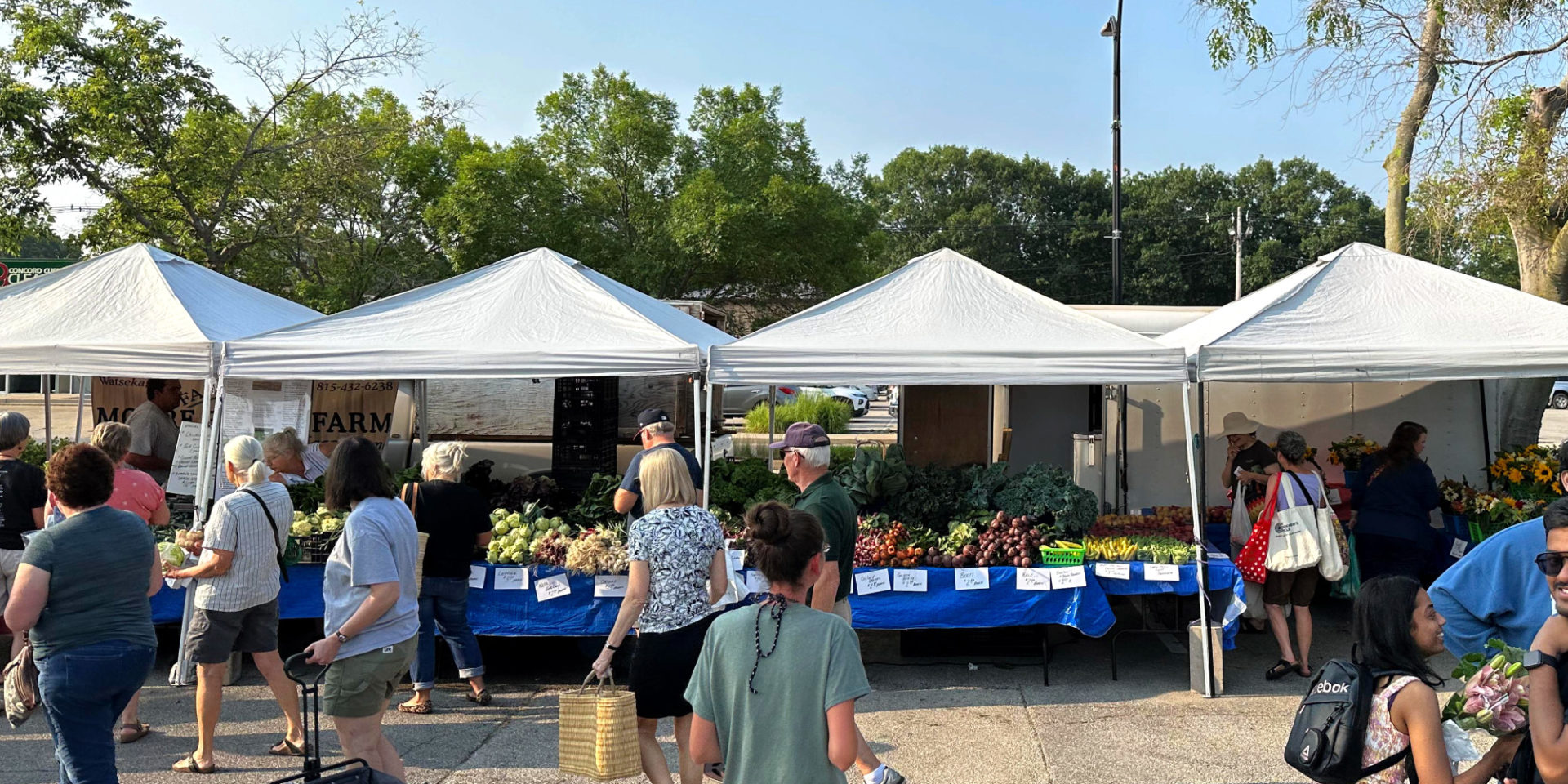It’s 1:30 a.m. on Saturday morning. Some patrons of the Urbana Market at the Square are just getting to bed. Diann Moore is just waking up. In those early hours of the morning, on a 100-acre farm north of Watseka, Illinois, 65 miles from the Lincoln Square Mall parking lot, Moore and her husband Jim carefully load bundles of refrigerated produce, eggs, and frozen meats onto their truck. Then, they start the hour-plus drive to Urbana so they can be ready when customers start walking to their stand at 7 a.m.
The farm has been in the Moore family for more than 100 years. Moore Family Farm sells vegetables and produce, as well as flowers, eggs, popcorn and meat that come from the Watseka farm. The family also tends another farm in Sadorus, Illinois, south of Champaign, that has been in Diann’s family for several generations.
The business is currently the longest full-time vendor at Urbana’s Market at the Square. Their produce has been feeding the Champaign-Urbana community for 35 years. In fact, when Moore started selling produce in Urbana, the market took place on the space now occupied by the federal courthouse on the corner of Elm and Vine.
Now, the market sprawls over several rows of parking at the corner of Illinois and Vine. The Moore Family Farm stand dominates one corner of the market, running parallel to Illinois Street and next to the market’s southwest entrance.

Moore can count on her fingers how many market weekends in Urbana she’s missed in those 35 years.
“We’ve watched a lot of change,” Moore told Smile Politely as the market began to get busy on a Saturday morning last month.
Her son, Wes, was six months old when the family farm started selling their products in Urbana. Now, Wes is an integral part of the operation and works the stand with Moore each weekend. On June 24, Wes’ son Oliver worked alongside his family for the first time, marking the third generation of Moore’s selling produce at the market.
The entire operation is centered around the Moore family. Moore, her husband, and son make up the core team, but other members of the family pitch in to help with blueberries and tomatoes and whenever additional help is needed. Working alongside family helps maintain Moore Family Farm’s high standards, Moore said.
Even when picking in the field, Moore said she’s thinking about how the produce will look at the market stand on Saturday.
“I’m pretty picky. I spend as many hours washing and bunching as I do harvesting,” Moore said. “I cull in the field; if I don’t like it or if it has a blemish, it stays in the field.”

But for Moore, being picky is an essential part of what makes the business successful. The Urbana market is a primary part of the farm’s revenue. In addition to selling weekly at the market, Moore Family Farm also has buying groups that reach customers as far away as Chicago. Common Ground stocks Moore Family Farm meat and eggs.
“This is our only farmer’s market; we’re full-time vendors,” Moore said. “It’s return customers that our livelihood depends on. Our farm depends on them.”
As Urbana’s Market at the Square has grown from one row of vendors to more than five, Moore said competition has made things challenging, but that the variety of vendors has helped bring more people through the market on any given weekend.
“[The growth of the market] is good; it’s made this a big drawing point,” Moore said. “But as a farmer where it’s our sole income, there’s only so many dollars that can come into the market, so when there’s more [vendors], that pie is getting divided.”
It’s not just market size or market traffic that affects the bottom line for Moore, it’s weather.
Earlier this summer, when drought conditions made farming unpredictable at best and impossible at worse, Moore said her family did everything they could to keep the tables at the market full. But that meant additional costs for electricity and equipment to keep crops watered, and dipping into winter feed reserves to keep animals fed. Normally, animals eat grass in the pastures during warm weather months.
“We’re going to have hills and valleys this year in production; we don’t know how this year is going to play out,” Moore said. “I don’t know what my income is going to be, or how much we’ll take home [from market earnings].”
It’s not just severe drought that threatens the farm but also flooding. The Watseka farm sits along the banks of the Iroquois River. Since 2008, the farm has experienced eight “100-year floods.”
“Eighty percent of my farm has gone underwater,” Moore said. “We’ve lived for five days where the only transportation is by boat. Our house stood okay, but we go from floods to droughts — and we never know [what will happen].”
Dealing with the volatility of conditions out of her control is just part of working on a farm, Moore said. Though weather conditions can cause the farm’s expenses to skyrocket, Moore said she tries to keep costs balanced during normal times by creating a relatively self-sustaining environment.
Selling meat is a core part of the business, and having animals around on the farm keeps the operation running smoothly. Hogs root up old crops, sheep aerate the soil and cattle keep the grass trimmed during summer months. The meat is processed offsite away from the farm according to Illinois state regulations.
And the farm adapts to changes in customer behavior, as well as their own bandwidth. One thing that hasn’t changed, though, is how Moore and her family rely on the Champaign-Urbana community to fund their business and keep their operation moving.
“It’s our livelihood,” Moore said. “We’re thankful [for the customers at the market]. We are grateful that they are here, and that they shop the outdoor market and that they’re trying to support local.”
For Moore, looking back over 35 years at the market, she sees her customers as an extension of herself and of her family business.
“I’m missing family weddings, I’m missing bridal showers, because [the market] sort of has to be the family, because this is where we are,” Moore said. “I’ve watched our kids and [now] our grandkids work the market. And now we’re feeding several generations of customers.”
Moore Family Farm doesn’t have an active website. They’re not on social media. But every week, they’re in the same spot, with tables full of produce and freezers full of meat. Moore said she hasn’t raised prices in more than six years, and is trying to keep the experience consistent for customers. Instead, Moore hands out little slips of paper with her products and personal cell phone number to market patrons asking to get in touch.

“The market is where people can find us,” Moore said. “Yes, you’re going to pay us more than Walmart, but my physical labor is in this. I can guarantee there are no chemicals on this. I’ve cleaned this. I’ve sorted this. It’s been picked with love. It’s been picked with care. I know what you’re getting.”
For Moore, the experience of depending on the community for their family’s livelihood is symbiotic. As she depends on them, they depend on her to deliver consistent, reliable produce to keep their own families fed.
“It’s a lot of responsibility,” Moore said. “One of our customers actually put it best many years ago, she said ‘Okay, I have picked you as our farmer just like I screen everyone to be our doctor. I think my priority is to also screen my farmers to know exactly what I’m feeding my family if I’m caring about everything else.’”
After noon, when the Urbana Market at the Square winds down, Moore loads now-empty containers into the truck, reversing the work from just a few hours before. The family begins the trek north back to Watseka where several more hours of work wait for them — there are livestock to feed, eggs to gather and wash and deliveries to the Chicago area to prepare for the next day.
“I don’t sleep. Not this time of year,” Moore said. “Well, really, it’s year-round. It’s 24 hours; it’s seven days a week, year round. It’s a commitment, but someone has to do it.”
Moore Family Farm
Urbana’s Market at the Square
May to October
Illinois and Vine
Urbana
Sa 7 a.m. to noon








